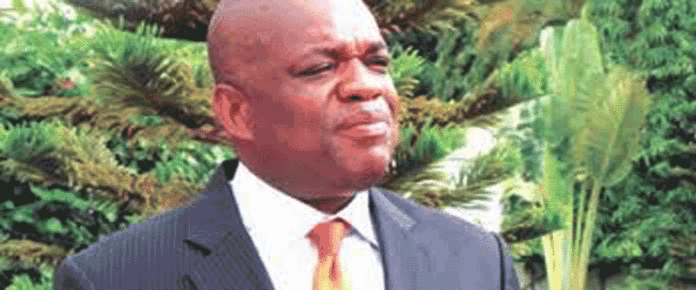By Emeka Alex Duru
Those that described the November 18 governorship election in Anambra State as preview or proxy war for 2019 politics, may be correct in some instances. Though certain permutations that preceded the poll did not fall through, some gave hints on the possible shape of events in the general elections, less than two years ahead.
Security threat and poll boycott
Up till Friday, November 17, the eve of the poll, there were strong fears on the exercise taking place the next day. For one, the call by the Indigenous Peoples of Biafra (IPOB), on the electorate to stay off the election, had not been lifted. Even with repeated appeal by elders and concerned groups from the state on the organisation to allow the election hold, IPOB had insisted on the position it had held, since last year, on the exercise.
Some members of the organisation, had even, few days to the election, held a demonstration in parts of Aba, Abia State to reinstate their position on the matter. They in fact, placed a curse on anyone that would dare to vote.
For them, it was “vote and die”. Given that the threat was not elaborately explained, there were palpable fears of radical members of the group inflicting attacks on anybody that ventured to step out to vote.
Though IPOB has not been known for employing violence in its agitation, apprehensions were high that given the recent Federal Government’s strong arm tactics against its activities, the members may not take any chance this time around.
Thus, even the assurance of being on top of the situation by the police and announcement of deploying 26,000 of its personnel for the election, did not assuage the fears. If anything, the announcement, coming on the heels of similar declaration by other arms of the security agencies such as the army, navy, civil defence corps, rather heightened tension in the state.
Anambra goes to poll
At last however, the election held without pronounced security challenges. 36 political parties participated in the election. But five appeared in the forefront.
At the end, Governor Willie Obiano of All Progressives Grand Alliance (APGA), won with a total vote of 234,071. Tony Nwoye of All Progressives Congress (APC), came second with 98,752 votes, while the Peoples Democratic Party (PDP) candidate, Oseloka Obaze took third with 70,593 votes, Godwin Ezeemo of Progressive Peoples Alliance (PPA), came fourth with 29,787 votes and Osita Chidoka of United Peoples Party (UPP) took the fifth position with 7,903 votes.
Aside the election eventually taking place despite initial fears, the turn out, though relatively low in terms of the number of registered voters, was greater than the situation in 2013, when there were no pronounced fears in the state.
While the Independent National Electoral Commission (INEC), registered 1.7 million voters in Anambra in 2013, it recorded 2.1 million voters in 2017, showing an increase of 400 newly registered voters.
The 21 local governments, 4,608 pulling units and 326 wards remained the same as in 2013. While the number of votes cast in 2013 was 411,336, the figure posted for 2017, stood at 411,019.
As in most instances of elections in the country, the turnout was poor. But considering that only 400 newly registered voters were recorded before the election, low voter turnout, could be said to have fallen into the prevailing pattern, elsewhere.
IPOB boycott may not therefore be said, to have been purely responsible. Neither the massive security build-up. It may have been attitudinal.
There were also some noticeable trends in the results by the various candidates. In 2013, Obiano won with 180,178 votes. But in the November 18 exercise, he won with 234,071 votes.
Nwoye who scored 97,700 in 2013 as PDP candidate, polled 98,752, this time around as APC flag bearer.
End of godfather politics?
A major point of note by informed analysts on the concluded Anambra election, is what seems the dying culture of godfather politics in the state. In 2013 when Obiano made his debut, he rode on the back of the then governor, Peter Obi, the state government and pervasive image of the late Igbo leader, Dim Chukwuemeka Odumegwu-Ojukwu.
In 2017, however, he was literally on his own, having fallen out with Obi. Ojukwu’s image in the state’s politics, was also not as prevalent as it was. Even his son, Emeka Ojukwu Jnr, had at the eleventh hour, dumped the governor for the rival APC. Thus, aside the leader of his reelection campaign organisation and former national chairman of the party, Victor Umeh and Ojukwu’s widow, Bianca, the governor almost ran the race without known faces that were with him in 2013.
Lagos-based Anambra indigene and political scientist, Patrick Nwabunnia, explained Obiano’s victory even in the absence of his former allies, as a testimony of the governor keeping faith with the people in terms of his performance profile.
“He knows who really his employers are. Power, he knows, belongs to the people. It is the people that vote, not the so-called big names. The big names may even not be as big as they appear in mobilising the people.
“Perhaps, in those days when the avenues of rigging had not been plugged, they could joggle figures for candidates of their choice. But times have changed. Obiano worked for the people and they rewarded him accordingly”, he said.
The overt rejection of godfather politics may have also affected Obi’s agenda at marketing Obaze. While the former governor laboured to convince the voters that they were better off with the PDP candidate in terms of prudence in management of the state’s resources, the message did not resonate. He was, rather seen in some quarters as trying to erect a political empire in the state. That, perhaps, accounts for why he could only mobilise 70,593 votes for Obaze, his protégé – a far cry to the 180,178 he galvanized for Obiano in 2013.
But it seems that it was in the loss by Nwoye that the Anambra voters openly expressed their rejection to godfather politics. With Nwoye earning 97,700 votes in 2013 as candidate of the then crisis-ridden state wing of the PDP, the expectation was that with the so-called federal might expressed in President Buhari’s presence at his rally, in addition to seven APC governors and other big names in south east politics, he would either dust Obiano or give him a serious run at the poll.
Among those from the zone present at the rally were, Labour Minister and former Anambra governor, Chris Ngige, former Abia governor, Orji Kalu, erstwhile old Anambra governor, Jim Nwobodo, former Senate President, Kenechukwu Nnamani and Emeka Ojukwu Jnr.
APC, south east and 2019
A lecturer in History Department of Nnamdi Azikiwe University, Awka, who asked not to be mentioned, simply dismissed the big names paraded by APC for Nwoye, as “spent forces, merely living on past glory”. According to him, APC, in relying on them to make inroad in the south east, is making a wrong calculation, “since they have never worked for the people, but for themselves, with possible exception of Nwobodo”.
He added that APC may need to do more work in wooing the people before seeking their votes in 2019. “For now, the indices of alignment between the south east and Buhari-led APC are not there. The people are yet to see the APC as a party that has their interest at heart. Buhari’s posture has also not helped matters.
“In addition, the people they are fronting as their arrow-heads in penetrating the region are more of spent forces living on past glory. They have not been known to be for the people, except, possibly, Jim Nwobodo, who gave a good account of himself as a governor in the second republic. Others are mere merchants simply out for themselves. APC in trying to enter the south east in 2019, should not bank on them”, he advised.
APGA unbound?
There were fears before the election that Obiano losing the election, would mark the end of APGA. But with his victory, the party has regained its voice, vigorously.
Our correspondent, for instance, learnt that with the outcome of the election in favour of APGA, Abia and Imo State wings of the party, are greatly energised for 2019 elections. In Abia, Dr. Alex Otti, who flew the flag of the party in 2015 and lost to Governor Okezie Ikpeazu in controversial circumstances, is said to be gearing up for another attempt at the office. The unflattering performance profile of Ikpeazu is what he is essentially banking on to give the exercise another trial.
In Imo, Rochas Okorocha’s alleged gamble at anointing one of his relations as his successor, is not going down well with his fellow APC chieftains. Some are said to be mulling defection to other parties. And with PDP in the state in unending crisis, APGA, on which the governor was originally elected, may turn out the beautiful bride.















